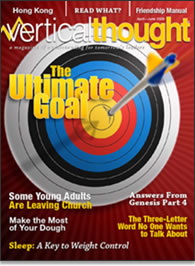

Information Related to "How Do You Measure Success?"
 | Audio/Video |
 Everyone
wants to be a success. As young people, we dream of having all the good
things in life—a great job in a career we enjoy, friends, a happy marriage,
vacations, opportunities to travel, plenty of leisure time and perhaps
even a pet or two. For many, this is success.
Everyone
wants to be a success. As young people, we dream of having all the good
things in life—a great job in a career we enjoy, friends, a happy marriage,
vacations, opportunities to travel, plenty of leisure time and perhaps
even a pet or two. For many, this is success.
But according to studies, many people these days aren't happy. A common assumption is that happiness is based on prosperity. So with the current economic problems affecting people everywhere, we shouldn't be all that surprised that many people aren't happy. Right?
When asked how much more money they'd need to be happy, people, on average, answered 20 percent. But as STLtoday.com explained: "It turns out that's not true. If you measure people's income and self-reported happiness over time, you find that while incomes may rise, the general level of happiness does not. That's called the Easterlin Paradox, named after economist Richard A. Easterlin" ("Cold Cash v. Warm Puppy," July 14, 2008).
So what really makes people happy?
Arthur Brooks, in his 2008 book Gross National Happiness: Why Happiness Matters for America—and How We Can Get More of It, writes that marriage makes people happy but most couples' happiness levels fall after having children. Having more money doesn't make people happy but giving money away to a charity does. He also says that it is work, not leisure, that makes Americans happy.
One of the most intriguing of Brooks' contentions is that religious people are happier than the nonreligious. Yet critics counter that religion in America simply gives people more social opportunities, a cause to which they can give money and an explanation for the meaning and purpose of life—all things already known to promote happiness. Critics further argue that highly secularized countries, such as those in Europe, are equally happy without religion. So who's right?
When trying to sort out conflicting opinions, there is only one sure source that has always proven to have accurate, up-to-date advice. This source is the Word of God found in the Holy Bible. (Don't take my word for it—prove it for yourself. Our free booklet Is the Bible True? can help.)
Solomon, the wisest and richest king of his time (1 Kings 10:23), concluded that "true happiness lies in eating and drinking and enjoying whatever has been achieved under the sun, throughout the life given by God: for this is the lot of humanity" (Ecclesiastes 5:17-18, New Jerusalem Bible).
Yet we must recognize and appreciate life's blessings as "given by God" in the context of following God for them to truly satisfy. Psalm 146:5 states, "Happy is he who has the God of Jacob for his help, whose hope is in the LORD his God." Proverbs 3:13 further notes, "Happy is the man who finds wisdom, and the man who gains understanding." Of course we must then apply this. As -Proverbs 29:18 says, "Happy is he who keeps the law." So real success involves a life well-lived.
This issue is dedicated to helping you learn godly wisdom and understand true success. Our wish is that each of you will have an abundantly happy life based on this sure knowledge. VT
Comments or QuestionsRelated Information:
Table of Contents that includes "How Do You Measure Success?"
Other Articles by David Treybig
Origin of article "How Do You Measure Success?"
Keywords: wisdom understanding success work leisure
Success: